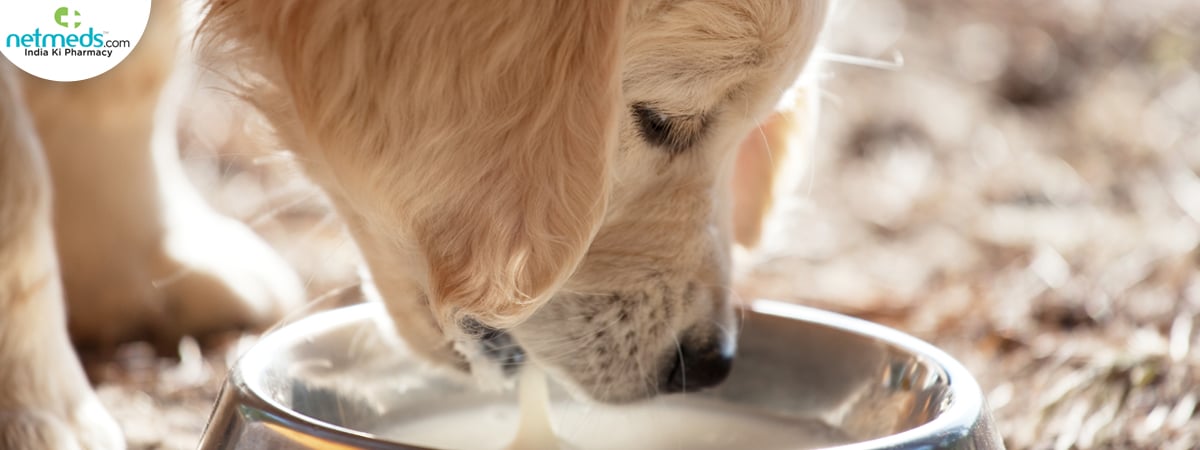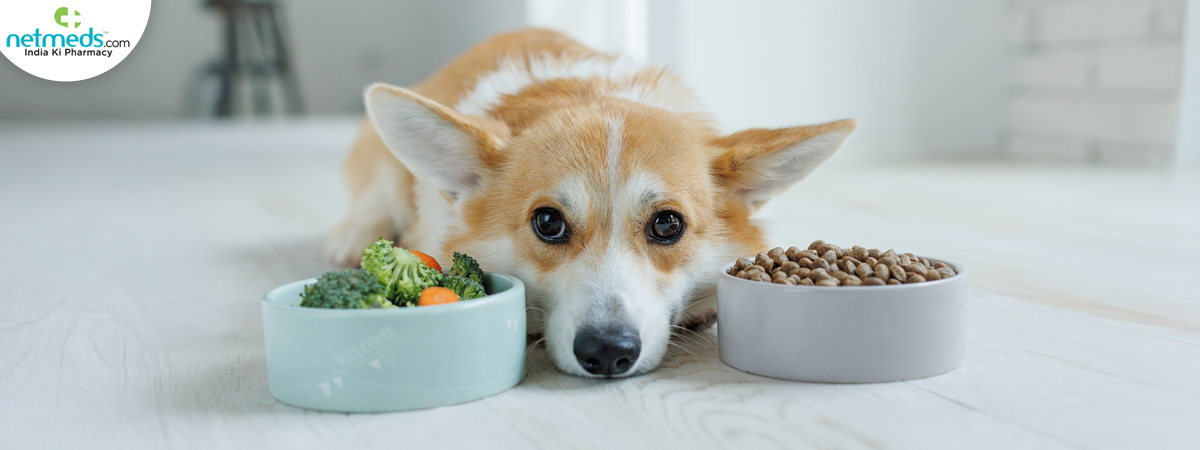Milk is a staple in many households, considered a good food ingredient for all. As pet parents, it is natural to wonder if your furry companion can enjoy a sip now and then. Whether it is cow’s milk, goat’s milk, or even plant-based alternatives, many dog owners have several questions about milk, its intake, and if it is a complete food for your little pups and senior ones too. In this article, we will explore the benefits and risks of milk for dogs, how it affects their health, and five safe and healthy alternatives to milk that your pup or your adult furry friend may enjoy even more.
Also Read: How To Support Ageing Pets: Mobility, Supplements And Key Comfort Tips

Should Dogs Drink Milk?
Though very subjective and depending upon a dog’s breed, age, and health, dogs can drink milk if they can, but in small amounts. However, it is not an essential part of their daily diet. The main concern with giving milk to dogs is lactose intolerance. Like humans, many dogs lose the ability to digest lactose properly, the sugar found in milk,k after weaning. But some dogs tolerate milk very well in moderation. The key is knowing your dog’s digestive limits and starting with a small amount if you have never given them milk before. Moreover, it is important to remember that dogs should get most of their nutrients from balanced commercial dog food or a vet-approved homemade diet. Milk should only ever be a treat, not a primary food source.
Shop From Our Wide Range Of Pet-Health Essentials
Lactose intolerance in dogs can lead to:
· Gas
· Bloating
· Diarrhoea
· Vomiting
· Digestive upset
Nutritional Benefits Of Milk For Dogs
If your dog can tolerate lactose, milk can offer some nutritional benefits, such as:
Calcium And Phosphorus
These minerals are crucial for maintaining healthy bones and teeth. Additionally, calcium also supports muscle function and nerve transmission.
Protein
Milk contains high-quality animal protein, which supports muscle repair and growth, important for active and growing dogs.
Vitamins A, D, And B12
These vitamins are essential for overall well-being and support vision, immune health, and energy metabolism.
Healthy Fats
Milk contains essential fats that provide energy and support skin as well as coat health.
Also Read: Pet Challenges: 5 Everyday Problems Every Pet Owner Comes Across. Tips To Solve
What Are The Risks Of Feeding Milk to Dogs
While milk has some benefits, the risks may outweigh the rewards for many dogs. Here are the main concerns:
Lactose Intolerance
This is the most common issue. Symptoms usually appear within a few hours of consuming milk and can range from mild gas to severe diarrhoea.
Obesity
Milk contains sugar and fat, which can contribute to weight gain if fed regularly, especially in dogs with a sedentary lifestyle.
Allergies
Some dogs may have an allergy to dairy proteins, leading to skin irritations, ear infections, or chronic itching.
High-Calorie Content
A single cup of whole milk contains around 150 calories, which is quite a lot for a small dog. Over time, this can lead to caloric excess and weight issues.
Also Read: Winter Pet Care: Top Tips To Ensure Your Furry Friend’s Health And Comfort

What Type Of Milk Is Best for Dogs?
If you do want to share a little milk with your pup, opt for:
Lactose-Free Milk: It is specially formulated for lactose-intolerant pets or humans.
Goat’s Milk: Due to smaller fat globules and slightly lower lactose content, goat’s milk is easier to digest for your four-legged companion.
Raw Milk: Some dog owners swear by raw milk for its probiotic benefits, but it carries a risk of bacterial contamination. Always consult your vet. Avoid flavored milk, condensed milk, and non-dairy creamers, as these often contain sugar, artificial sweeteners (such as xylitol, which is toxic to dogs), or preservatives.
5 Healthy Food Alternatives For Dogs
If you are looking for a safe and nutritious beverage for your pup, here are five great milk alternatives that are generally better tolerated and come with added health benefits.
Goat’s Milk (Raw or Pasteurized)
Why is it good?
Goat’s milk is often easier for dogs to digest than cow’s milk. It’s rich in probiotics, calcium, and fatty acids. Start with one or two tablespoons mixed into food or as a treat. Choose pasteurized, pet-safe versions when possible.
Benefits Of Goat’s Milk
· Supports digestive health
· Boosts the immune system
· Helps with food sensitivities
Bone Broth
Why It Is good?
Bone broth is a nutrient-rich liquid made from simmered animal bones. It's packed with collagen, glucosamine, and minerals. Add a splash to your dog’s kibble or serve it chilled as a refreshing treat. Avoid broths with onions, garlic, or added salt
Benefits Of Bone Broth
Supports joint health
Boosts digestion
Encourages hydration
Coconut Milk (Unsweetened)
Why is it good?
While high in fat, unsweetened coconut milk contains medium-chain triglycerides (MCTs) that support brain function and energy levels. Use small amounts only, such as one or two tablespoons for small dogs and up to one-fourth cup for larger breeds. Always choose unsweetened, xylitol-free coconut milk. Too much can cause loose stools.
Benefits Of Coconut Milk
Supports skin and coat health
Offers anti-inflammatory properties
Enhances energy
Pumpkin Puree (Mixed With Water)
Why is it good?
Not a milk per se, but a great nutrient-packed alternative. Pumpkin is high in fibre, beta-carotene, and vitamins. Mix one or two tablespoons of canned pure pumpkin with water for a milk-like drink.
Benefits Of Pumpkin Puree
Regulates digestion
Promotes a healthy gut
Low in calories
Dog-Specific Milk Replacers
Why is it good?
These are commercial milk products formulated for dogs, often used for puppies but also suitable for adult dogs as a treat. However, follow package directions and serve as an occasional treat.
Benefits Of Dog-Specific Milk Replacers
Balanced for canine nutrition
Low in lactose
Fortified with vitamins and minerals
When to Avoid Giving Any Milk/Dairy?
There are specific situations where no dairy, including milk alternatives, should be offered without veterinary guidance. Here are some of them:
· Dogs with chronic digestive issues
· Dogs with a history of pancreatitis
· Dogs on a low-fat diet
· Dogs with known food allergies
Should You Give Milk To Your Dog?
While the image of a dog lapping up a bowl of milk is cute, as a wholesome meal, it may not always be the best idea. Most adult dogs don’t need milk, and many have some degree of lactose intolerance. If your dog can tolerate it, milk can be an occasional treat, but it should never replace a balanced diet. If your dog experiences vomiting, diarrhoea, or excessive gas after consuming any form of milk or dairy product, stop immediately and consult your vet at the earliest opportunity.
(This article is reviewed by Kalyani Krishna, Chief Content Editor)
Author Profile: Preeti Sharma
Preeti Sharma has a master’s in electronic media and mass communication and certification in short-term writing from Florida. With close to a decade of experience, she specializes in crafting engaging blogs on beauty, veterinary care, and healthy cooking. Preeti is proficient in video editing tools and produces captivating and informative content across multiple platforms.



 Previous
Previous